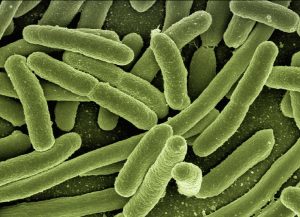A “superbug” clone of E. coli has evolved to prevent itself from becoming so dominant that it could potentially wipe out the bacteria from existence, scientists led by the University of Birmingham have discovered.
The researchers investigated how and why a clone of E. coli called ST131 has become the major cause of drug-resistant E. coli infections, but not so dominant that it has wiped out other clones that do not have multidrug resistance.
Escherichia coli (E. coli) is a type of bacteria common in human and animal intestines, and forms part of the normal gut flora, the bacteria that exist in the bowel. There are a number of different types of E. coli and, while the majority are harmless, some can cause serious food poisoning or infections including in the urinary tract or bloodstream.
The number of cases of E. coli have risen by 27% from 32,309 in 2012-13 to 41,060 in 2017-18. The rise has been linked to an increase in antibiotic resistant infections caused by so-called “superbugs.”
“The most globally dominant clone of E. coli that is resistant to multiple drugs is called ST131,” said Alan McNally, PhD, of the University of Birmingham’s Institute of Microbiology and Infection.
“Earlier research has shown that while ST131 emerged and rapidly spread in the late 1990s, it caused no more than 20% of clinical cases of E. coli once it had emerged on the scene.”
He continued, “Following our research, we now know that while there are significantly dominant drug resistant clones of E. coli such as ST131 and other new ones are emerging all the time, it seems highly unlikely that any of them are ever going to become a completely dominant clone because this process called NFDS controls the balance across the whole E. colipopulation.”
Professor Jukka Corander, of the Wellcome Sanger Institute in Cambridge, the University of Oslo in Norway, and the University of Helsinki in Finland, said that as part of the research the scientists also analyzed almost 1,000 genome sequences of strains within ST131 to see if they could find any genetic patterns that may explain how this process happens.
“We found that in the ST131 clone there was a lot of variation in the genes that are involved in allowing the bacteria to colonize in the human gut when compared to those in non-drug resistant bacteria that are very closely related to ST131,” he said.
“If a person is going to get a bloodstream or urinary infection from E. coli it usually comes after it has colonized in the gut, therefore we now know that genetically something has happened to this superbug which allows it to colonise the gut far more competitively than other E. coli.”
He continued, “If we can understand why a multi-drug resistant E. coli out competes our resident healthy E.coli in the gut, we can try and find ways to prevent this from happening. This now needs to be the focus of further research.”
The research, published in mBio, was also carried out in collaboration with the British Society of Antimicrobial Chemotherapy, the Wellcome Trust Sanger Institute, the London School of Hygiene and Tropical Medicine, and Imperial College London.
Source: University of Birmingham
Scientists discover how ‘superbug’ E. coli clones take over human gut
74
SHARES
1.2k
VIEWS
Leave a Reply Cancel reply
Browse by Category
Tags
AAMI
AORN
Award
Bacteria
BIOCHEMISTRY
biology
cancer
CBSPD
Chemotherapy
colon cancer
colorectal cancer
colorectal cancer screening
COVID-19
Diagnostics
Duodenoscope
Education
EndoChoice
EndoPro Magazine
Endoscope
Endoscopy
FDA
gastroenterology
gastrointestinal disorders
Genetics
Healthmark
Hospitals
IAHCSMM
IBD
IBS
Infections
irritable bowel syndrome
MEDICINE/HEALTH
News
Olympus
Pentax
PHARMACEUTICAL CHEMISTRY
PHARMACEUTICAL SCIENCE
polyps
PPE
Public Health
recall
Screening
SGNA
Studies
Super Bugs
© 2023 Copyright. All Rights Reserved. Design & Developed by Insightful Technologies.














